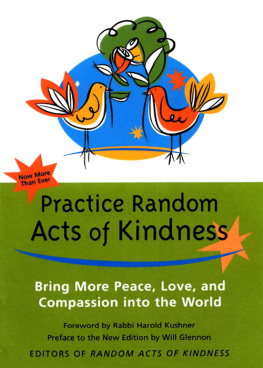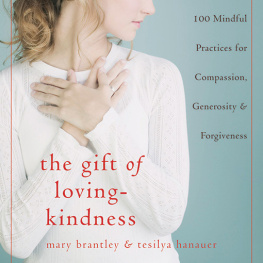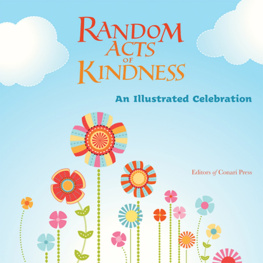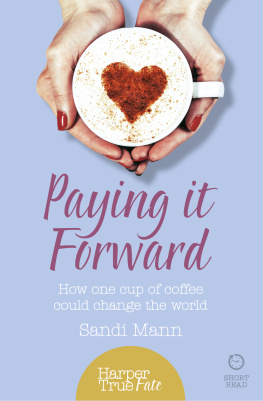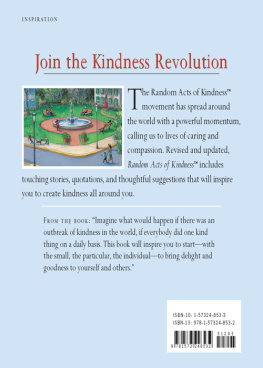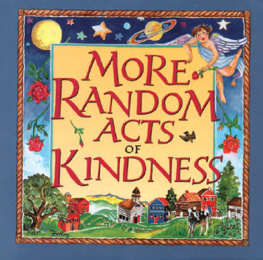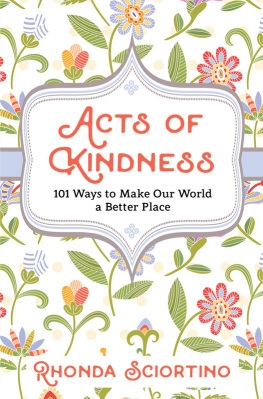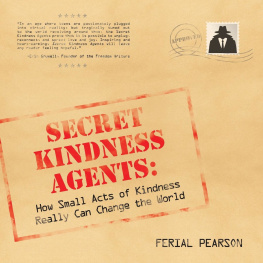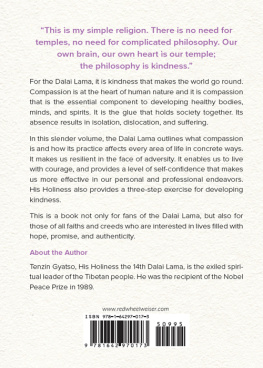The Random Acts of Kindness Series
Random Acts of Kindness
More Random Acts of Kindness
Kids' Random Acts of Kindness
The Practice of Kindness

This edition first published in 2007 by
Red Wheel/Weiser, LLC
With offices at:
500 Third Street, Suite 230
San Francisco, CA 94107
www.redwheelweiser.com
Copyright 2007. All rights reserved. No part of this publication may be reproduced or transmitted in any form or by any means, electronic or mechanical, including photocopying, recording, or by any information storage and retrieval system, without permission in writing from Red Wheel/Weiser, LLC. Reviewers may quote brief passages.
Originally published as The Practice of Kindness in 1996 by Conari Press,
ISBN-10: 1-57324-272-1
ISBN-13: 978-1-57324-272-1
Library of Congress Cataloging-in-Publication Data
available upon request
Cover and book design by Suzanne Albertson
Typeset in Berkeley and Triplex
Cover art Cindy Jeftovic/Corbis
TCP
10 9 8 7 6 5 4 3 2 1
www.redwheelweiser.com
www.redwheelweiser.com/newsletter
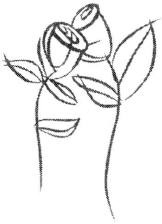
Even as a mother protects with her life
Her child, her only child,
So with a boundless heart
Should one cherish all living beings;
Radiating kindness over the entire world.
THE BUDDHA
Contents

Humans are powerful spiritual beings meant
to create good on the earth. This good isn't
usually accomplished in bold actions, but in
singular acts of kindness between people.
It's the little things that count, because
they are more spontaneous and
show who you truly are.
DANNION BRINKLEY
Foreword
Oscar Wilde once wrote, The nicest feeling in the world comes when you do a good deed anonymously, and somebody finds out. The great virtue of the classic best-selling Random Acts of Kindness series and of this successor volume with which I am honored to be associated is that they redeem so many acts of kindness from anonymity. We do something good and in many cases no one recognizes it or thanks us for it, and we are left to wonder, What's the point of going out of my way to be good if no one cares? These books teach us that many people do, in fact, care. Their content, and their reception by a public thirsty for such stories, teach us two valuable lessons.
The first is that performing an act of kindness is a tonic for the one who performs it. It is a cornerstone of my faith that, just as our bodies are made so that certain foods and certain habits are healthy and others are unhealthy, so are our souls made so that certain kinds of behavior nourish the soul and other kinds are toxic. Human beings were fashioned to be friendly, honest, and helpful to each other. When we act that way, when we resist temptation, when we go out of our way to do a favor for someone, we feel right. Something inside us says, Yes, this is the way a person is meant to feel. When we are deceitful or jealous, we are acting against our nature, and we have to work hard to resist the message our bodies and souls try to send us.
Some years ago, Duke University Medical Center did a study of Type-A personalities, the aggressive, hard-driving people who are always trying to get ahead and do several things at a time. They wanted to study whether such behavior affected a person's cardiovascular system. What they learned was this: If you are a Type-A because you enjoy the challenge of making things happen and knowing that they turned out well because of your efforts, You'll be fine. But if you believe that it's a jungle out there, that everyone is out to get you if you don't get them first, that constant hostility and suspicion will wear you down and diminish your life in both length and quality. Being kind to others is a way of being good to yourself.
The second great lesson of Random Acts oj Kindness and Practice Random Acts of Kindness is that when you are kind to others, it not only changes youit changes the world. Cumulative acts of kindness change the emotional climate in which we live. They teach people to see the world differently.
A woman has a flat tire while driving in a rainstorm. Two teenagers come along and offer to change it. That brief encounter will permanently alter the way that woman thinks about life and about young people. She will tell her friends about it and change their outlook as well. She will share the story with her own children and increase the chances that they grow up to be teenagers who will stop to help a motorist in trouble.
A teacher in an inner-city public school notices a spark of lively intelligence in one of her pupils that poverty and hunger have not been able to extinguish. She encourages that child, buying her food and books out of her own pocket. That child grows up to be a doctor, a nurse, an athlete, a politician, and becomes a role model for thousands. How do we measure the impact of the good deeds we do?
Being in a totally dark room can be frightening until we discover how little light we need to banish a roomful of darkness. The pain, the hopelessness of the world, may look insurmountable until we move to counter them with our little deeds of kindness.
Why did God create the world and fill it with such erratic, unpredictable creatures as we human beings are? One Jewish tradition would have it that God made the world the way it is so that we would have the possibility of being nice to each other. The Talmud teaches that when a person does a good deed when he or she didn't have to, God looks down and smiles and says, For this moment alone, it was worth creating the world.
When we go out of our way to be kind to someone, in large ways or small, our reward is the knowledge that we have redeemed the world.
Rabbi Harold Kushner
Preface
When this book was first published we were forced to ask ourselves the question why? Why, if, as we firmly believe, kindness is such a natural part of our makeup, would anyone need a book that helps her learn how to practice and master it? All these years later the answer to that question has taken on an even more compelling urgency. It may sound overly dramatic, but I think it's safe to say that today the only thing stopping us from dramatically changing the trajectory of human history for the better is a paucity of kindness and compassion.
It is a fascinating but very strange time we live in. After thousands of years of killing each other on a regular basis, suddenly the people of Europe have taken a good, long look at their brutal and bloody history, their neighbors, and themselves and decided it was all one long series of mistakes and they are really one people after all. At the same time, as our planet seems to be getting smaller and smaller every year, we are bumping up against our once-distant neighbors more and more often and discovering all new levels of misunderstanding and conflict. Those of us living in the United States, by virtue of its position as the last remaining superpower, find ourselves perhaps unwillingly, but nonetheless most certainly right in the midst of it all.
For most of usjust struggling to move forward on the path of our personal lives, to find our place in the world, perhaps to raise a family and to live with honesty and integrity, the level of anger and hostility bombarding us is both frightening and mystifying. We do not really know what is going on. Yet at the same time our own media outlets are swamping us with photos, firsthand accounts, and looping videos of gruesome images of the human carnage resulting from roadside bombs, indiscriminate killings, and the collateral damage of bombs made in the USA. And this disturbing flood of news is accompanied by a steady drone of nearly hysterical, saber-rattling politicians trying to convince us to put our trust in them because we are in a long, bloody, life-and-death struggle of good versus evil that demands our heightened and eternal vigilance.
Next page
